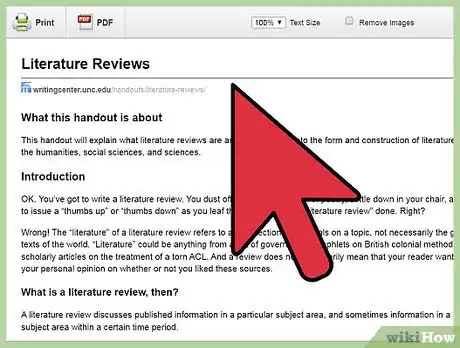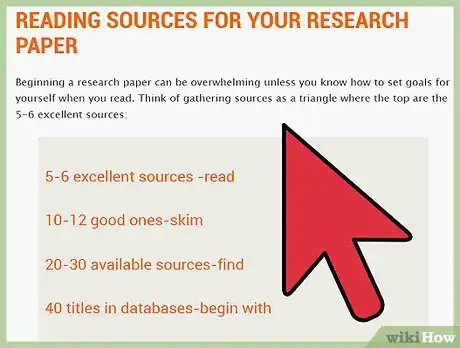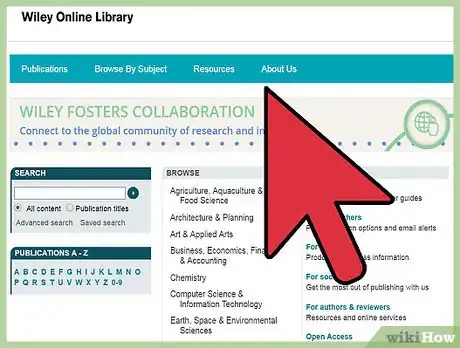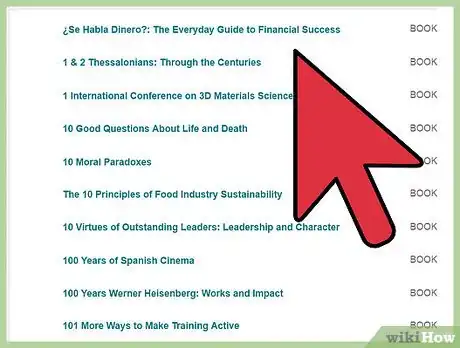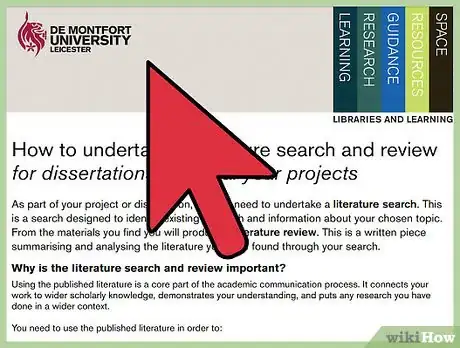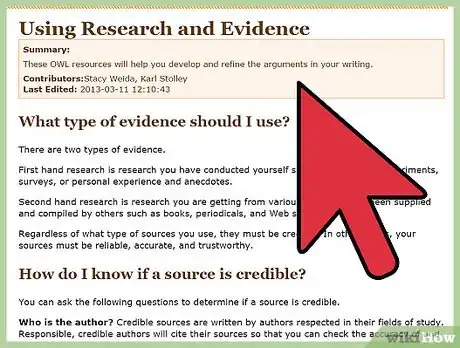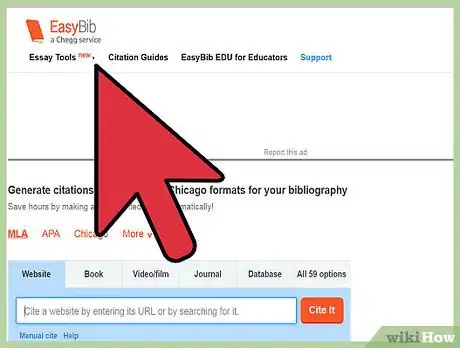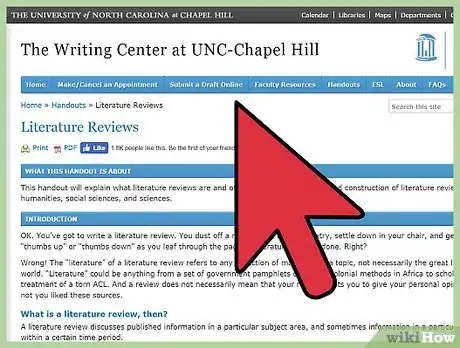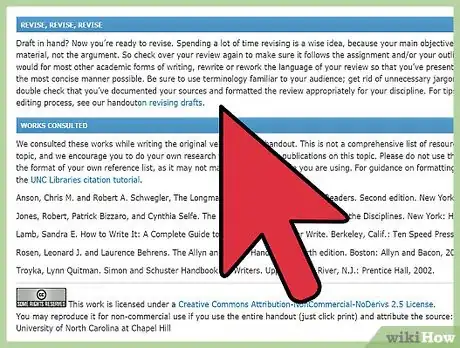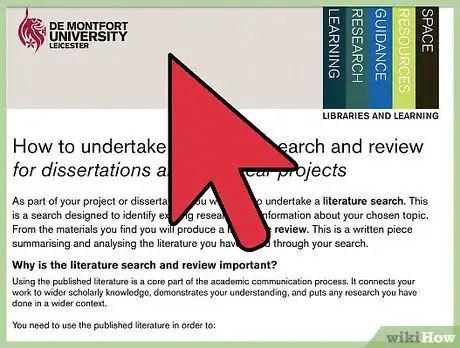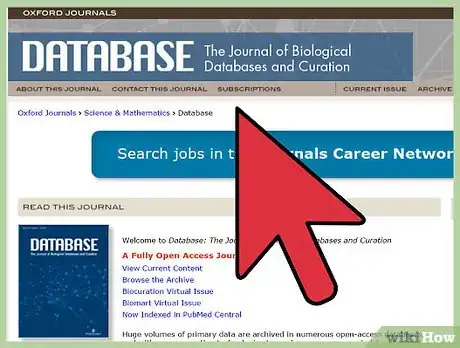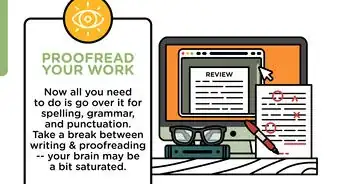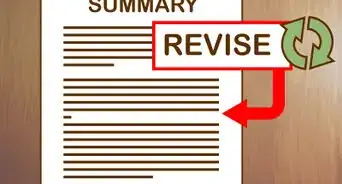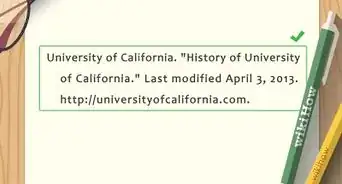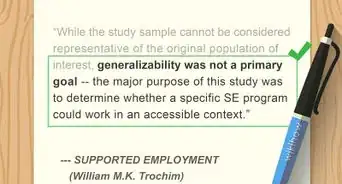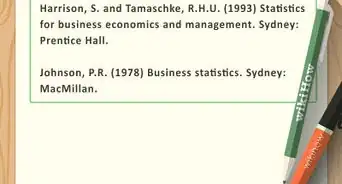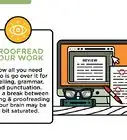This article was co-authored by Michelle Golden, PhD. Michelle Golden is an English teacher in Athens, Georgia. She received her MA in Language Arts Teacher Education in 2008 and received her PhD in English from Georgia State University in 2015.
This article has been viewed 21,852 times.
A literary search is an important part of any research work. It allows you to have a comprehensive listing of relevant sources on a given topic. It also forces you to figure out how these sources are relevant to your goals as a researcher, giving you a more informative and educated sense of where your research falls in the academic community. To do a literary search, start with some planning. You'll need to specify your topic and figure out what and where to search. From there, do extensive research and find a variety of sources. Write up summaries of the sources, while making connections between them, and then proofread your search and look for any places where additional research may be necessary.
Steps
Planning Your Search
-
1Specify your topic. To start your literature review, you'll need to narrow down your topic. You probably already have a broad topic in mind. Take some time to figure out what aspect of that topic you want to focus on in your search.
- If you're doing a literature search for a class, you may have a broad topic to explore in that class. For example, it may be a literature course focusing on Shakespeare. The topic Shakespeare, however, is far too broad.
- You'll have to find a field of literary theory, as well as a subject within Shakespeare, through which to explore the topic. For example, maybe you want to focus on the play Hamlet. You may want to look into the philosophies of relativism and existentialism in the play. Your topic could be something like, "relativism and existentialism in Hamlet" instead of just "Shakespeare."
-
2Choose your search words. From here, you'll need to choose your key search words. These are the words you'll be typing into search engines and library databases. These words can help you find relevant sources for your project.
- You'll want to use as many different search words as possible to find an extensive list of sources. It can help to break down your topic and think of synonyms for each relevant word. For example, say your topic is, "Changing portrayals of women in independent film in American culture." Keywords that pop out are "women," "independent film," and "American culture."
- Think of synonyms for each these terms you can use to search. Synonyms for "American culture," for example, may include things like "United States culture" or "US culture." Synonyms for "independent film" could include something like, "mumblecore film" or "indie film."
- You should also think about the kinds of topics that may be addressed within your topic. For example, you could search something like, "female archetypes" or "female tropes." You could also search a particular trope or archetype that's been critiqued by film critics. You may want to search for something like, "mother figure" or "manic pixie dream girl."
Advertisement -
3Do some background reading. In order to conduct your search appropriately, some background reading is necessary. Read some other literature reviews of projects related to your topic. See what kind of sources were used. Pay attention to how these reviews were organized. Do they go in chronological order? Are they organized by topic? You should read a few peer-reviewed research papers, which you can find at most academic libraries, on your subject. Keep track of what names and authors crop up again and again in these sources so you get a sense of the big names in your field.[1]
-
4Focus on the right types of sources. You want to make sure the sources you use in a literature review are appropriate for the project. Think about what kind of sources are typically used when researching a given field.
- You'll need a combination of sources for any research project, so be open to a wide variety of material. Usually, for academic research, academic journals published through universities are a good place to start. There are general academic journals, and also journals specific to a single field.
- You should also be open to some less academic sources, if it feels appropriate. For example, topical articles on film written by journalists may help supplement academic research if your topic is women in independent film. This can help showcase how attitudes towards female characters are changing, and how the voices of critics shape the trajectory of the film industry.
-
5Consider how many sources you may need. There is no set number of sources that is considered the norm, but you can use the length of a project to help you determine how many sources you may need. For example, a 10 page paper might require around 10 to 15 sources, while a 300 page dissertation may require 100 or more sources.
- Keep in mind that you will have to consult more sources than you will end up using.[2] For example, you may find around 40 good sources in a database search, but you may only be able to access 20 of those sources in the time frame you need. Then of those 20 sources, you may only find that 12 of them really suit your topic.
- Check with your instructor as well. Some college writing assignments will have a minimum source requirement. If the guidelines for your paper are unclear, then just ask.
Conducting Research
-
1Search through an online library. The best place to start is usually a library. If you have access to an online library database, use it. You can search your keywords and identify sources that may help you. You may be able to access certain documents online, or reserve a copy that you can pick up at the library later. This can save you the time of researching at the library.
- Many online libraries have the advantage of pointing you to texts that exists in libraries outside of your region. Depending on library policy, you may be able to order these books from faraway libraries.
- In the event you cannot order a book from a remote library, see if you can take out an electronic copy from an online library or find the source at another nearby library.
-
2Go to a university or local library. It's always a good idea to go to a physical library to find sources. While an online library can help you get started, you'll need to go to many individual libraries to form as comprehensive an overview as possible.
- Bring your list of keywords to an online library. You can enter your search terms into the computers at the library, which will link to an electronic card system that shows where you can find relevant resources in that location.
- You can ask a librarian for help. Librarians are valuable resources and may be able to offer you search tips that will be helpful to your research.
-
3Research online with caution. Online sources can be helpful. However, doing a random search into a generic engine like Google may yield untrustworthy results. Use discretion when seeking out resources online.[3]
- Instead of using a generic google search, use something like Google Scholar which will link you to academic citations.
- You may also be able to find databases online that contain many academic sources. Online databases like JSTOR and Academic One File, for example, can be good places. Keep in mind, however, you need a subscription for a lot of these types of sources. If you're currently a student, you may have access through your college or university.
-
4Read your sources and take notes. Once you've read through your sources, read carefully and take notes as you go. Actively reading your sources will help you down the road as you begin to analyze them and incorporate them into your literature search.[4]
- As you read, pay attention to the authors' main ideas. Jot down the central themes of each work, as well as the evidence the author uses to support those themes.
- Look for any flaws in the work. Does the author seem to have any biases that are cropping up? Is the author examining the issue from every possible angle? If you notice any flaws, write them down.
- If you see a particular article or author mentioned across several works, you may want to read a bit by this author. When doing a literature search, you want to incorporate as many influential texts on the subject as possible.
-
5Use your sources to find additional sources. You can check the sources that other authors have used to support their claims and doing this may lead you to some helpful sources for your topic.[5] As you read your sources, note any information that came from another source and identify the source that it came from.
- Depending on the documentation style that the author used, the source may be provided within the text, at the bottom or the page, or at the end of the book or article.
- When you find a source you would like to use, take a moment to write down relevant information about the source, such as the author’s name, the title, and the date it was published.
- Keep in mind that it is important to locate the original text and read it yourself before you decide to quote it. Quoting a source within a source is not a good idea because you will not have the full context behind the information.
-
6Track citations. You do not want to have to write down all your citations at once when you finish the project. As you go, write down the citations for the works you're using. Have a document on your computer with all your sources listed and cited.
- Follow the citation style recommended by your instructor or commonly used in your field. You'll typically be using either MLA citations or APA citations.
- If you're unsure how to cite a source, you can use resources like EasyBib to cite the source for you. However, you should double check when you're done to make sure the source was cited corrected.
Assembling Your Materials
-
1Decide how to organize your search. Once your materials are ready to go, you can begin assembling and writing your literature search. Your instructor may have specified a method of organization for your search. However, if no method was specified, there are several ways to organize your search.[6]
- You could order the review in chronological order, placing the earliest sources first. This may be helpful if you're tracking the history of a subject and how it's changed over time.
- You could also organize the review by trend or topic. This is particularly helpful if you're examining several schools of thought. Returning to the Shakespeare example, you could group writings on relativism in one section, writings on existentialism in another, and so on.
- For more scientific research, you could organize by method. This means splitting up sources by the methods in which research was conducted. For example, one section focuses on double-blind studies while the other focuses on blind studies.
-
2Write a brief summary of each source. From here, you'll want to write a brief paragraph summarizing each source for the reader. Write a brief few sentences summarizing what the author of the source is arguing.[7]
- Be careful not to use too many quotes. In literature searches, extensive quoting is uncommon.
- Make sure to use your own voice. You want to avoid sounding like you're plagiarizing or imitating a source.
-
3Explain the source's relevance to your project. In addition to summarizing the source, talk about how it is relevant to your project. You're likely making a central claim or series of claims in your research project. Make it clear how your sources support or do not support the claim. If your sources provides a counterargument, briefly explain how you plan to refute this argument.[8]
- Explain how a source is important to the ideas you're trying to express. You should not just summarize the sources. Synthesize them into your work as well.
- If one source is supplemental to another, link them in the review. For example, you may include a film review blasting the manic pixie dream girl trop.
- Explain how this review conveys an argument made in an academic paper about viewers craving more realistic female characters.
-
4Cut out sources if you have too much. You may find your literature search is too long. You may have incorporated sources that do not speak to your project. Try to cut out sources that are only tangentially related to your topic. If there is a limit to how many sources you can include, make sure to stay within that limit.[9]
-
5Locate additional resources if there are gaps in your project. You may find you need more information in certain fields. If you feel one area of interest is under-researched upon completing your review, find a few more sources in that area and add them. For example, you may find you have a lot of information about films from the early 2000's, but late 90's films are neglected. Return to a library or online database to fill in these gaps.[10]
-
6Take out sources that are not appropriate for your project. Make sure all your sources are academic in nature, or tie in to an existing academic source. Cut out sources that are from pop magazines and non-peer reviewed journals.[11]
- You can make sure to avoid bad sources by limiting searching to journal database, online libraries, and physical libraries.
- If you do use an online source, sources that end in .edu or .ac tend to be more academic in nature.
References
- ↑ http://writingcenter.unc.edu/handouts/literature-reviews/
- ↑ https://www.csuohio.edu/writing-center/reading-sources-for-your-research-paper
- ↑ https://www.reading.ac.uk/library/eresources/lib-websites.aspx
- ↑ http://www.library.dmu.ac.uk/Images/Howto/LiteratureSearch.pdf
- ↑ https://owl.english.purdue.edu/owl/resource/588/02/
- ↑ http://writingcenter.unc.edu/handouts/literature-reviews/
- ↑ http://writingcenter.unc.edu/handouts/literature-reviews/
- ↑ http://writingcenter.unc.edu/handouts/literature-reviews/
- ↑ http://www.library.dmu.ac.uk/Images/Howto/LiteratureSearch.pdf


